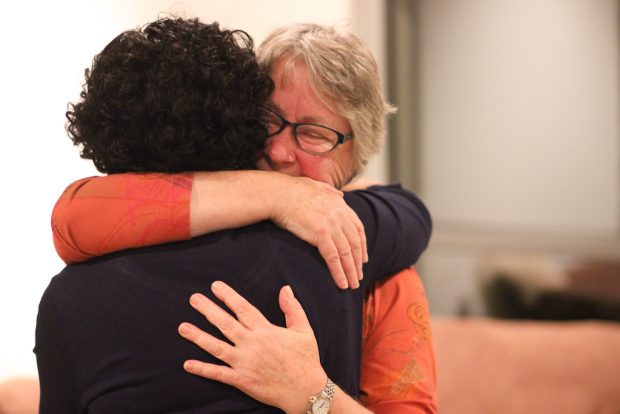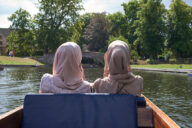When we send our children away to boarding school believing they will get a better education, what are we setting them up for? Can an education away from the parental home be truly supportive in developing us as fully rounded human beings? School is not the only part of our education – our living environment makes a difference too.
So, how was life at boarding school? I can remember the good bits and tend to forget the bad bits, but I do recall that I was terrified of the nun who looked after us, and even more terrified of the Mother Superior. I survived by being a ‘good girl,’ always looking for acknowledgement from the teachers and nuns that I was ‘OK.’
I was born overseas in Baghdad, Iraq, and when I was 6 years old, a few months before my 7th birthday, my parents sent me to a Catholic boarding school run by nuns in the UK. There were three of us, so I was not completely alone as I had my two sisters there, but when my own daughter was seven and we were enjoying lots of hugs together, it made me wonder what had I missed by spending so many of my younger years away from my parents.
Baghdad is 3,000 miles from London and in the 1950s that meant three plane hops, so we only travelled back home for the summer holidays. I only saw my parents for 8 weeks in each year until I was 12, when they returned to England to live. After that I lived at home and attended the same school as a day student until I left at 18.
I don’t think we were ever a particularly close family but there was a great ex-pat social life in Baghdad and my parents would attend loads of parties. During the day we spent most of our time at a club that had lawns, an outdoor restaurant, a climbing frame and three swimming pools. We had some fun times, but my mother was always chatting to her friends and we played with ours. Dad was at work.
Once we were all together in our house in England, we were still distant.
As a family we would eat together but I don’t remember them as particularly momentous occasions — the radio was usually on, and then we kids would wash up together then go outside and play with our neighbourhood friends. There were times when my parents would argue and my mother was always convinced she was right. My father would give up and go outside to smoke his pipe. I used to argue with my middle sister with whom I shared a room, so our life together was not particularly harmonious.
Moreover, my parents were not really huggy people, whereas I love hugs. When I first went to the boarding school I do remember the Italian maids, who were always up for a hug and, as I was one of the youngest and probably cute at that age, I had loads of attention from them. Despite that, and because of the lack of physical affection in my own family, I grew up feeling like an alien, distant from all humanity. I felt unlovable and instead of being open and friendly with everyone, I created a hard shell of mistrust and a spikiness that stopped anyone from feeling my true vulnerability, including me.
The combination of the separation from my parents, boarding school and the Catholic upbringing, left me with a few emotional scars, such as feeling unworthy, constantly guilty that I might be doing something wrong, needing to be good and wanting to do everything right.
At school we were encouraged to compare and compete, with everyone being streamed into class groups according to academic ability. In the senior school, we were also split up into four houses that competed in sports and we’d get house-points for good behaviour, so comparison and competition was encouraged in all aspects of my schooling.
The attitude of competition stayed with me as an adult: in sport playing squash, and with friends, comparing what jobs we were doing and how much we were earning. At work I would measure myself against more experienced colleagues and put myself down for not performing as well as them. Both comparison and competition leave me feeling very tired, so it is something I have recently been learning to observe and let go of.
Thanks to the many presentations of Serge Benhayon and healing sessions with Esoteric Practitioners trained by Universal Medicine, I am also learning to let go of the hard shell of protection that I developed in my body and to let people in. I am getting lots of hugs from fellow students, which is lovely, but I still find myself being distant at times, and I find it hard to express my love in words. If someone expresses their love and appreciation of me, I often find it hard to accept, not really believing it to be true.
I now know that it is important to appreciate who I truly am, to feel how tender I can be, moving gently, being calmer inside, connecting deeply with people, making good eye contact and speaking from my heart instead of my head. These days I don’t need so many acknowledgements from anyone outside of myself. I don’t need to try to be good or right because I can enjoy simply being me.
When families do not freely express their love for one another, it does not provide a great foundation for us in the future. My experience was compounded by being separated from everything I knew and sent to a Catholic boarding school. It gave me a good education, but I have realised that what value is mental intelligence and achievement when it stops us from truly loving ourselves and our fellow human beings, and from living in harmony with each other?
It is 60 years since that first day at boarding school and the scars are only now truly beginning to heal. It is not ‘time’ that has healed me, but deliberate healing through self-care, learning to nourish and nurture myself and to appreciate that I am so much more than my education.
What I bring is more than my brain’s intelligence and what I know; I bring a warmth, love, tenderness, and caring for all humanity that was never taught at school, or even in the Catholic Church.
Schools and religions often tend to pick up on our faults and try to make us ‘better’, so we grow up thinking we are not enough and ‘need to try harder’. Instead of that approach, I am now learning to appreciate the amazing woman I truly am and, as I let go of the hardness, I am appreciating the absolute fragility and delicateness that is my natural and true way of being.
It has been a long journey that has highlighted to me the importance of loving all our children in full right from the start, spending time with them, expressing our love and appreciation to them, and encouraging them to be loving and open without fear so that no matter where they are, they can enjoy being beautiful, tender, expressive beings.
If that loving service can be offered in every family, every school, every boarding school, and in every religion, then perhaps we as a humanity can be secure in the knowledge that our children will be fully ‘educated’.
Published with permission of my family.
By Carmel Reid, Ocean Shores, Australia
Further Reading:
The true foundations of education – our future
Education, Schools & Teaching Our Kids: ‘Quality of Presence’ in the Classroom
The True Purpose of Education – One Size Fits All or Evolution?





